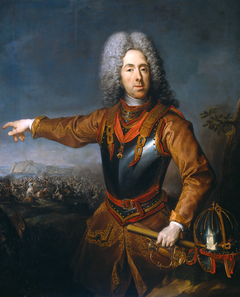
Back يوجين من سافوي Arabic الامير يوچين من ساڤوى ARZ Eugenio de Saboya AST Евгений Савойский Bashkir Prinz Eugen vo Savoyen BAR Яўген Савойскі Byelorussian Евгений Савойски Bulgarian Eugen Savojski BS Eugeni de Savoia Catalan Evžen Savojský Czech
| Eugene of Savoy | |
|---|---|
 Portrait of Prince Eugene of Savoy, 1718 by Jacob van Schuppen | |
| Born | 18 October 1663 Hôtel de Soissons, Paris, Kingdom of France |
| Died | 21 April 1736 (aged 72) Vienna, Archduchy of Austria, Holy Roman Empire |
| Burial | |
| House | Savoy-Carignano |
| Father | Eugene Maurice of Savoy |
| Mother | Olympia Mancini |
| Signature | |
| Military career | |
| Rank | Field marshal |
| Conflicts |
|
Prince Eugene Francis of Savoy-Carignano[1] (18 October 1663 – 21 April 1736), better known as Prince Eugene, was a distinguished field marshal in the Army of the Holy Roman Empire and of the Austrian Habsburg dynasty during the 17th and 18th centuries. Renowned as one of the greatest military commanders of his era, Prince Eugene also rose to the highest offices of state at the Imperial court in Vienna spending six decades in the service of three emperors.
Born in Paris, to the son of a French count and a niece of Cardinal Mazarin, Eugene was raised at the court of King Louis XIV. Initially destined for the priesthood as the youngest son of a noble family, he chose to pursue a military career at 19. Due to his poor physique and possibly a scandal involving his mother, Louis XIV denied him a commission in the French Royal Army and forbade him from enlisting elsewhere. Embittered, Eugene fled France and entered the service of Holy Roman Empire's Emperor Leopold I, cousin and rival of Louis XIV, where his elder brother, Louis of Savoy, was already serving.
At 20, Prince Eugene of Savoy distinguished himself during the Ottomans Siege of Vienna in 1683. Commanding troops at Budapest (1686) and Belgrade (1688), he became a field marshal by age 25. In the Nine Years' War, he fought alongside his distant cousin, the Duke of Savoy. As commander-in-chief in Hungary, Eugene's decisive victory at the Battle of Zenta (1697) ended the Ottoman threat for nearly 20 years. During the War of the Spanish Succession (1701–1714), he served Emperor Leopold I, achieving victories in Italy and forming a crucial partnership with the Duke of Marlborough, securing wins at Blenheim (1704), Oudenaarde (1708), and Malplaquet (1709). His success continued in Italy, notably at Turin (1706). Renewed Austro-Turkish conflicts saw Eugene triumph at Petrovaradin (1716) and Belgrade (1717), solidifying his legacy as one of Europe's greatest military commanders and securing peace in 1718.
Throughout the late 1720s, Eugene's diplomatic skills secured powerful allies for the Emperor in dynastic struggles with the Bourbon powers. Physically and mentally fragile in his later years, Eugene saw less success as commander-in-chief during the War of the Polish Succession (1733–1735). Despite his opposition to the conflict, he loyally led a defensive campaign, preventing enemy invasion of Bavaria. During his peaceful years, Eugene accumulated a vast collection of art and literature and corresponded with contemporary artists, scientists, and philosophers. His architectural legacy includes Baroque palaces like the Belvedere in Vienna. He died on 21 April 1736, aged 72.
© MMXXIII Rich X Search. We shall prevail. All rights reserved. Rich X Search